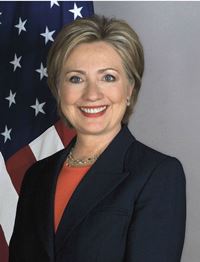 |
| Hillary Clinton |
Presidential hopefuls such as Hillary Clinton, Bernie Sanders and Donald Trump like to talk a big game when it comes to drug pricing, laying out proposals that include giving Medicare the power to negotiate prices. But actually bringing those policies to light could be an uphill battle, some health experts say.
"There's no magic bullet" for bringing down rising drug costs, and solving the problem "will require a whole range of policies," John Rother, president and CEO of nonpartisan research group the National Coalition on Health Care, told Kaiser Health News.
For starters, Clinton, Sanders and Trump have all zeroed in on allowing Medicare to negotiate prices for all--or at least, the most expensive--drugs, an approach that was banned by a Republican-led Congress in 2003.
But the Congressional Budget Office has said that lifting the ban on Medicare price negotiation "would have a negligible effect" on cost because the government might not get lower prices for meds than private drug benefit providers, the Kaiser Health News article points out. And the Obama administration is singing a similar tune, estimating no savings from such a provision as part of its fiscal 2017 budget.
The only way Medicare negotiation would work is if the program decided to cover some drugs and not others, similar to systems found in countries such as the U.K. But that strategy would probably trigger political backlash as the industry rails against restrictive pricing policies.
Clinton, a vocal drug pricing critic, has also proposed capping how much patients have to pay out of pocket for their drugs. But that strategy is "just a cost shift," Alissa Fox, senior VP of the Blue Cross Blue Shield Association, told the news service. "You're really just requiring everyone else (in the insurance pool) to pay those costs," Fox said, which in turn would raise premiums.
Another idea that has been bandied about by Sanders and Clinton is letting Americans buy cheaper drugs from countries with price controls, including Canada and Japan. But health officials are not fans of the idea, pointing to potential safety issues with drugs from other countries.
 |
| John Rother |
While the candidates' plans may seem good to some in theory, they could have trouble gaining traction. Leading drug industry trade group Pharmaceutical and Research Manufacturers of America (PhRMA) spent more than $18 million lobbying Congress in 2015, U.S. News & World Report points out. As a result, bills introduced that would allow Medicare to negotiate drug prices, including one introduced by Sanders in September, have stalled.
Carrying an olive branch, rather than fiery torch, might be the only way to make headway on pricing, some experts say. "Most of this issue involves trade-offs. You do need incentives (for drugmakers) to produce new drugs," Rother said.
- here's the Kaiser Health News story
- read the U.S. News & World Report article
Special Reports: The top 10 most expensive drugs of 2013 | 10 big brands keep pumping out big bucks, with a little help from price hikes